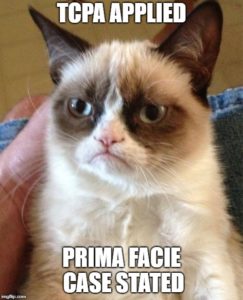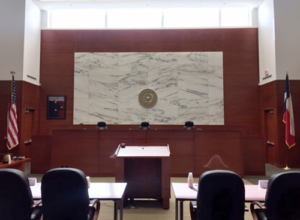 Wyde sued Francesconi for unpaid legal bills; among other defenses, she argued that Wyde did not mitigate his damages by withdrawing when payment problems first became evident. The Fifth Court, noting Wyde’s testimony that “when we take on a client, we’re loathe to make it a purely financial relationship,” and “we stuck it out . . . we aren’t just lawyers who say pay us or to hell with you,” found that he had no duty to mitigate. It reasoned: “[R]equiring or encouraging attorneys to file a motion to withdraw as soon as a client fails to pay conflicts with the aspirational goals of the Texas Lawyer’s Creed.” Wyde v. Franesconi, No. 05-17-01333-CV (Dec. 19, 2018).
Wyde sued Francesconi for unpaid legal bills; among other defenses, she argued that Wyde did not mitigate his damages by withdrawing when payment problems first became evident. The Fifth Court, noting Wyde’s testimony that “when we take on a client, we’re loathe to make it a purely financial relationship,” and “we stuck it out . . . we aren’t just lawyers who say pay us or to hell with you,” found that he had no duty to mitigate. It reasoned: “[R]equiring or encouraging attorneys to file a motion to withdraw as soon as a client fails to pay conflicts with the aspirational goals of the Texas Lawyer’s Creed.” Wyde v. Franesconi, No. 05-17-01333-CV (Dec. 19, 2018).
Monthly Archives: December 2018
In Jordan v. Klingbeil, “the trial court’s Octob er 23 Order indicates the trial [judge] intended for its September 22 Order to constitute a final and appealable judgment that disposed of all claims.” Unfortunately for the appeal, however, the Fifth Court noted (1) “factual recitations or reasons preceding the decretal portion of a judgment form no part of the judgment itself,” and (2) “the October 23 Order cannot constitute a final judgment because it lacks the decretal language typically seen in a judgment” [such as “ordered, adjudged, and decreed,” etc.]. Because of these shortcomings with the October 23 Order, and the September 22 Order’s failure to address all causes of action or include Lehmann finality language, there was no final judgment and thus no appellate jurisdiction. No. 05-17-01228-CV (Dec. 18, 2018) (mem. op.)
er 23 Order indicates the trial [judge] intended for its September 22 Order to constitute a final and appealable judgment that disposed of all claims.” Unfortunately for the appeal, however, the Fifth Court noted (1) “factual recitations or reasons preceding the decretal portion of a judgment form no part of the judgment itself,” and (2) “the October 23 Order cannot constitute a final judgment because it lacks the decretal language typically seen in a judgment” [such as “ordered, adjudged, and decreed,” etc.]. Because of these shortcomings with the October 23 Order, and the September 22 Order’s failure to address all causes of action or include Lehmann finality language, there was no final judgment and thus no appellate jurisdiction. No. 05-17-01228-CV (Dec. 18, 2018) (mem. op.)
 Rasul v. Rasul involved an unusually exotic forum non conveniens dispute, comparing the courts of McKinney, Texas to those in Afghanistan and Pakistan. The Fifth Court affirmed dismissal of the dispute. The threshold issue – whether the courts of those two countries are “available forums” – was resolved by a decidedly un-exotic point about the role of stipulations, of broad
Rasul v. Rasul involved an unusually exotic forum non conveniens dispute, comparing the courts of McKinney, Texas to those in Afghanistan and Pakistan. The Fifth Court affirmed dismissal of the dispute. The threshold issue – whether the courts of those two countries are “available forums” – was resolved by a decidedly un-exotic point about the role of stipulations, of broad  general interest outside of this context:
general interest outside of this context:
A defendant may demonstrate the availability of a forum by stipulating that it would submit to personal jurisdiction there. Appellees offered their consent to jurisdiction in writing in their motion to dismiss and in their reply brief in support of that motion; they repeated the offer at the hearing on the motion to dismiss. “A ‘stipulation’ is an agreement, admission, or concession made in a judicial proceeding by the parties or their attorneys respecting some matter incident thereto.” Appellees’ concession that they would submit to jurisdiction was made by their attorneys during the judicial proceeding surrounding the motion to dismiss. It was an effective stipulation, and therefore was sufficient to establish Afghanistan and Pakistan as available forums.
When styled as a “Rule 11 Agreement,” the case law about this kind of stipulation can be surprisingly confusing; this straightforward treatment of the point helps clarify those cases. No. 05-17-00612-CV (Dec. 17, 2018) (mem. op.)
My LPCH colleague John Adams and I recently published a similar version of this article in the Texas Lawbook:
Newly elected judges on courts of appeals may soon find themselves at odds with the steadfastly conservative Texas Supreme Court. As the intermediate courts of appeals grapple with their role in shaping Texas jurisprudence, a firmly rooted – albeit faded – distinction between factual and legal sufficiency may return to a prominent place in appellate review. Specifically, courts of appeals may be able to limit state Supreme Court review by deciding cases based on factual sufficiency of the evidence.
This distinction between legal and factual sufficiency review is a unique feature of Texas practice. It stems from the Texas Constitution, which says that “[T]he decision of said courts [of appeals] shall be conclusive on all questions of fact brought before them on appeal or error.”
Thus, whether or not evidence is factually sufficient is a question for courts of appeals that the Texas Supreme Court cannot review.
Factual sufficiency is commonly understood to be a higher threshold than legal sufficiency, although in practice it can be difficult to distinguish the two standards. As the legal sufficiency standard has evolved toward an “inclusive” review of evidence (in other words, considering all evidence) – particularly after cases such as City of Keller v. Wilson – that standard has become less distinguishable from factual sufficiency.
Nonetheless, a distinction remains. Generally, under a factual sufficiency standard of review, a court of appeals must consider all evidence but may disregard evidence in support of a verdict if that evidence is against the clear weight and preponderance of other evidence. On the other hand, to determine legal sufficiency, a court must consider all evidence in a light favorable to the verdict – disregarding only evidence a reasonable jury couldn’t consider.
The effect of this distinction is that if a court of appeals determines that evidence is factually insufficient (although legally sufficient), the Texas Supreme Court is stuck with that decision, assuming the court of appeals applied the correct standard.
So the Texas Supreme Court cannot review whether the evidence is factually sufficient, but it can review whether the court of appeals conducted the appropriate analysis. This means the court of appeals must “detail the relevant evidence and clearly state why the evidence is factually insufficient.”
For decades, the distinction between factual and legal sufficiency has had minimal effect. The courts of appeals and the state Supreme Court have generally been in harmony about how to apply the standards of review. But for three decades, justices on the major courts of appeals and Texas Supreme Court were mostly elected from the same party with relatively low turnover.
But now, Texas has a fresh class of justices in many courts of appeals. For example, for the first time in 30 years, the Fifth Court of Appeals will be composed of mostly justices elected from the Democratic Party. Of course, many of these newly elected justices may have different perspectives from legacy state Supreme Court justices.
One way that new friction between the courts of appeals and the Texas Supreme Court may manifest is through a revitalized distinction between factual and legal sufficiency. In particular, courts of appeals may emphasize factual sufficiency to limit the Supreme Court’s review.
 The 600Camp blog has a page of my tips about legal writing; several of those tips involve different tests to eliminate unhelpful extra words and passive voice. I recently learned of a new such test called “Anglish” that focuses on the origin of words, and seeks to use only words that entered the language before the Norman Conquest. (An example of the resulting prose, from Wikipedia: “I am of this opinion that our own tung should be written cleane and pure, unmixt and unmangeled with borowing of other tunges; wherein if we take not heed by tiim, ever borowing and never paying, she shall be fain to keep her house as bankrupt.“) I don’t recommend it for legal writing, but it is an interesting exercise that shows the remarkable ability of English to absorb words from other languages.
The 600Camp blog has a page of my tips about legal writing; several of those tips involve different tests to eliminate unhelpful extra words and passive voice. I recently learned of a new such test called “Anglish” that focuses on the origin of words, and seeks to use only words that entered the language before the Norman Conquest. (An example of the resulting prose, from Wikipedia: “I am of this opinion that our own tung should be written cleane and pure, unmixt and unmangeled with borowing of other tunges; wherein if we take not heed by tiim, ever borowing and never paying, she shall be fain to keep her house as bankrupt.“) I don’t recommend it for legal writing, but it is an interesting exercise that shows the remarkable ability of English to absorb words from other languages.
 After a reversal and remand to the Fifth Court on whether the TCPA applied to Adams’s speech (it did), that Court examined in detail whether Starside had made a prima facie case of its claims. In particular: “As to Starside’s defamation claim based on the homepage of Adams’s blog and the statements in the March 18, 2015 email that Starside failed to comply with City ordinances when removing trees from the common area, we conclude Starside pleaded and submitted evidence establishing the ‘when, where, and what was said,’ the defamatory nature of the statements, and that the statements were defamatory per se.'” Adams v. Starside Custom Builders LLC, No. 05-15-01162-CV (Dec. 7, 2018).
After a reversal and remand to the Fifth Court on whether the TCPA applied to Adams’s speech (it did), that Court examined in detail whether Starside had made a prima facie case of its claims. In particular: “As to Starside’s defamation claim based on the homepage of Adams’s blog and the statements in the March 18, 2015 email that Starside failed to comply with City ordinances when removing trees from the common area, we conclude Starside pleaded and submitted evidence establishing the ‘when, where, and what was said,’ the defamatory nature of the statements, and that the statements were defamatory per se.'” Adams v. Starside Custom Builders LLC, No. 05-15-01162-CV (Dec. 7, 2018).
The restricted appeal case of Cate v. Posey reminds:
- A difference in addresses noted in the record may not be material if the record also accurately establishes personal service; and
- A CPRC § 18.001 affidavit of reasonableness can be sufficient evidence to support the damages portion of a default judgment, but not if a referenced itemized list is not included in the record.
No. 05-17-01216-CV (Dec. 4, 2018) (mem. op.)
 The Merrill Hartman Courtroom has been extensively remodeled for use by the Fifth Court, with space for potential visits by the Texas Supreme Court and Court of Criminal Appeals, and the Fifth Court has been using it for oral arguments throughout 2018. A rededication ceremony for that courtroom, with a reception to follow, will be held Wednesday, December 12, from 11:30 AM to 1:30 PM in the Hartman Courtroom. It is located on the 8th floor of the George Allen Courthouse at 600 Commerce in downtown Dallas.
The Merrill Hartman Courtroom has been extensively remodeled for use by the Fifth Court, with space for potential visits by the Texas Supreme Court and Court of Criminal Appeals, and the Fifth Court has been using it for oral arguments throughout 2018. A rededication ceremony for that courtroom, with a reception to follow, will be held Wednesday, December 12, from 11:30 AM to 1:30 PM in the Hartman Courtroom. It is located on the 8th floor of the George Allen Courthouse at 600 Commerce in downtown Dallas.
 Complex settlement agreements often require a series of actions to resolve both the parties’ business affairs and ongoing litigation. In Ticer v. Reed Migraine Centers, the parties’ agreement grew so detailed that the Fifth Court found it ambiguous and reversed a summary judgment. One side
Complex settlement agreements often require a series of actions to resolve both the parties’ business affairs and ongoing litigation. In Ticer v. Reed Migraine Centers, the parties’ agreement grew so detailed that the Fifth Court found it ambiguous and reversed a summary judgment. One side  argued that the parties’ releases were effective on signing; the other side, that the releases were only effective upon the making the required payments. “[U]nable to harmonize the foregoing provisions to give effect to all the provisions in the Agreement,” the Court remanded. No. 05-17-00721-CV (Dec. 4, 2018) (mem. op.)
argued that the parties’ releases were effective on signing; the other side, that the releases were only effective upon the making the required payments. “[U]nable to harmonize the foregoing provisions to give effect to all the provisions in the Agreement,” the Court remanded. No. 05-17-00721-CV (Dec. 4, 2018) (mem. op.)
 In this article, my colleague Paulette Miniter and I analyze the potential effect on federal-court removals of the recent changes to the Texas state bench (elections installing Democratic majorities on the largest intermediate appellate courts) and the Fifth Circuit (several new appointments by President Trump.
In this article, my colleague Paulette Miniter and I analyze the potential effect on federal-court removals of the recent changes to the Texas state bench (elections installing Democratic majorities on the largest intermediate appellate courts) and the Fifth Circuit (several new appointments by President Trump.
Under McConnell v. Southside ISD, 858 S.W.2d 337 (Tex. 1993), a party may specially except to a summary judgment motion that is unclear about its grounds. Lemus v. Cookscreek 255 LLC provides a detailed application of McConnell as to eight different claims in a premises liability case, and also reminds: “The excepting party must obtain a ruling on the special exception to preserve the issue for appeal.” No. 05-17-01085-CV (Nov. 30, 2018) (mem. op.)
 A union won a lawsuit about DART’s handling of employee grievances; the Fifth Court largely affirmed but reversed an award of damages for harm to reputation. Applying principles from lost-profits cases, the Court observed: “Day provided no factual support for his opinion that an additional twenty percent of DART’s employees would have joined ATU 1338 if it had been more successful in obtaining hearings before the Trial Board, did not identify any DART employees who would have joined ATU 1338 if it had more success in obtaining hearings before the Trial Board, and made no attempt to trace any damages specifically to DART’s or Johnson’s actions relating to the March 3rd grievance.” DART v. Amalgamated Transit Union, No. 05-17-01051-CV (Nov. 27, 2018).
A union won a lawsuit about DART’s handling of employee grievances; the Fifth Court largely affirmed but reversed an award of damages for harm to reputation. Applying principles from lost-profits cases, the Court observed: “Day provided no factual support for his opinion that an additional twenty percent of DART’s employees would have joined ATU 1338 if it had been more successful in obtaining hearings before the Trial Board, did not identify any DART employees who would have joined ATU 1338 if it had more success in obtaining hearings before the Trial Board, and made no attempt to trace any damages specifically to DART’s or Johnson’s actions relating to the March 3rd grievance.” DART v. Amalgamated Transit Union, No. 05-17-01051-CV (Nov. 27, 2018).